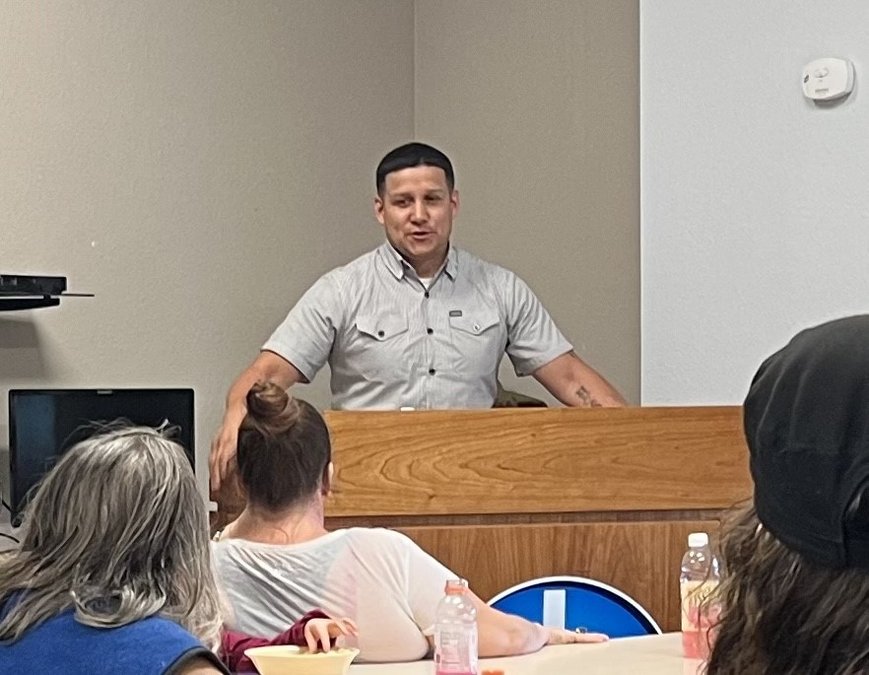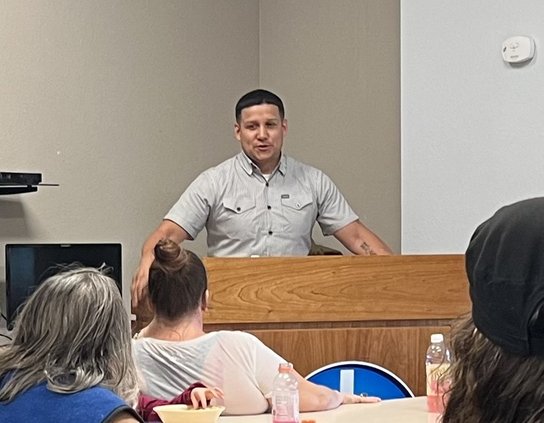EDITOR’S NOTE — The Turlock Journal is publishing a series of articles on the issue of homelessness in the city of Turlock. Each week, we’ll take a look at this complex problem from a different perspective: law enforcement, city government, business owners, non-profit groups, neighboring communities and everyday citizens.
George Retana served seven years in the U.S. Marine Corps.
On March 14, 2007, during his first tour in Iraq, his M1A1 Abrams tank struck a 500-pound explosive device. He was knocked unconscious by the blast and had to be pulled from the burning wreckage.
After leaving the military, Retana developed an addiction to alcohol as a coping mechanism for post-traumatic stress disorder. And on Christmas Eve 2008, he tried to do what Al Qaeda could not.
He attempted to take his life.
After two tours of duty in the Middle East, suffice to say, Retana knew how to handle a weapon. But when his .40-caliber Smith & Wesson handgun jammed on three separate occasions, you have to figure it wasn’t due to operator error.
“I believe that was a miracle from God himself,” said Retana, who now serves as president of Veterans in Action, Inc., a non-profit organization that serves various needs of the community — including homelessness.


On a recent Wednesday afternoon, Retana is preparing for one-hour group session at the Turlock Gospel Mission. Nearly 20 people assemble in a room just off the Jeani & John Ferrari Gathering Hall. A thermostat on the wall is the only thing that could pass as decor in the room. Nevertheless, it has everything Retana needs: chairs and a rapt audience, one of which any school teacher would be envious. Retana’s charges are attentive and participate enthusiastically in the discussion.
It’s one part Bible study, one part motivational speech and one part seminar.
Retana asks how many in the group have been homeless. About two-thirds raise their hands — including Retana.
A native of Southern California, Retana chose to live on the streets as a teenager.
“I was escaping abuse at home,” said Retana. “I would go to school, shower and use the restroom there. The last period of the day, I had a culinary arts class and after class I’d pick stuff out of the garbage cans and stick it into my backpack to eat later.”
Caring and concerned teachers assisted him in getting off the streets, just like caring and concerned friends helped him overcome his alcoholism a decade later. Without that care and concern, Retana is convinced he would’ve become a statistic. Instead, he’s now on the frontlines of Turlock’s battle against homelessness every day, attempting daily to connect those living on the streets — are about to — with the help and services they need.
And that’s what Retana wants you to know about Turlock’s homeless situation: It’s all about connection.
Connecting and building relationships create a level of trust, he believes, that can result in even the most hardcore homeless cases turning around their lives. He’s seen it work.
“There are guys and girls I’ve met, seven, eight months ago, that were addicts,” said Retana. “They’re sober now, they’re going to MJC, they’re in a rehab program — and all it took was engagement and a little bit of time.”
Linda Murphy-Julien, executive director of United Samaritans Foundation, oversees the operation of five food trucks, delivering 1,500 free meals a day, five days week, to anybody who wants one. That includes nearly 2,900 meals this year to Stanislaus State students.
“We’ve got students living in cars because they want to get educated and get to that next level, but they can’t afford a place to live,” said Murphy-Julien.
That highlights the other point Retana wants to drive home: not all homeless people are drug addicts. Some are college students faced with a choice between tuition or housing. Others are fleeing physical abuse, like Retana. Still others have simply fallen on hard times financially.
It’s a point Retana attempted to make at the city of Turlock’s first town hall meeting on homelessness Sept. 22 at the Turlock Senior Center.
After waiting his turn to address the crowd, Retana returned to his seat and listened to others take their turn at the microphone. Finally, he’d heard enough. He stood up from his seat in the audience and spoke out of turn, asking others to refrain from referring to the homeless as “those people.” Even as Police Chief Jason Hedden gently asked him to let others have their say, the old Devil Dog in Retana returned.
“I just thought there was some misdirected hate toward the homeless,” Retana explained. “I understand that people are frustrated. It’s hard. But Rome wasn’t built in a day.”





